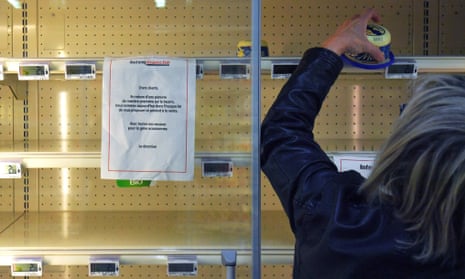Supermarket stocks are running low, people online are jokingly offering to sell a half-eaten pack for €250, and a film shot in the dairy-loving region of Brittany features deprived addicts roaming the streets like zombies.
For months, bakers, biscuit-makers, farmers and food producers have sounded the alarm over a dearth of butter in France. But this week, with French newspapers warning of the worst shortage since the second world war, the crisis has turned political as the government seeks to reassure consumers.
The reasons for the current shortage are complex. Falling levels of milk production, combined with a poor yield in 2016 and growing butter demand across the world, have resulted in a drop in supply and rising wholesale prices. The price of industrial butter has risen from €2,500 a tonne in April 2016 to €7,000 this summer.
The result is that pastry-makers and bakers cannot obtain enough wholesale butter to maintain normal production levels. Some French supermarkets – including in historic butter-producing areas like Brittany or Normandy – have had to put apologetic notes on empty butter fridges.
Makers of French pastries such as croissants – in which butter often makes up around a quarter of the content – have been grappling with rising prices and scarce supplies. They have warned that costs for consumers could also rise. Thierry Lucas, who has a bakery in the Finistère area, says he has already increased the prices of his croissants by five centimes.
Claude Francois, the owner of a small pastry producer in the central Cher region, has cut her workers’ hours by 70% because she cannot source enough butter to maintain output. “We’ve been on rationed supplies since mid August. We are only receiving a tonne a week when we need three tonnes ... We cannot go on like this for much longer,” she told the news agency AFP.
France’s agriculture and food minister, Stéphane Travert, has insisted the shortage will not last because low milk production levels will soon rise. But industry and farming insiders have warned the situation could continue through the autumn and into winter.
The turbulence in the butter market began when the EU abolished its system of milk quotas in 2015. At first there was a flood of milk supplies, causing a collapse in global prices that prompted dairy farmers to slash their output. Then butter consumption rose worldwide amid reports that it was no longer seen as a health risk and was better than vegetable-oil alternatives like margarine. Consumers in the US, China and the Middle East now eat ever increasing amounts of butter.
Yet dairy farmers complain they get little benefit from the growing butter markets, arguing that what they are paid is more often tied to cheaper raw milk and milk powder prices. Fewer farmers are producing milk for butter than those producing milk for cheese or cream.
In a country with the highest level of butter consumption in the world, the crisis is creating a headache for Emmanuel Macron’s government as it tries to fulfil an election pledge to support farmers in their negotiations with companies to get a fair price for their produce.
The agriculture minister has played down the suggestion of acute shortages, but he told parliament this week that retailers and suppliers should agree price adjustments in order to maintain deliveries.
French consumers have not yet seen butter prices rise at the checkout because supermarket groups fix their prices once a year. But this means butter suppliers currently get better margins by selling elsewhere.
Some French shoppers, seeing the headlines, have been rushing to buy butter and freezing it, worsening the depleting supermarket stocks.
